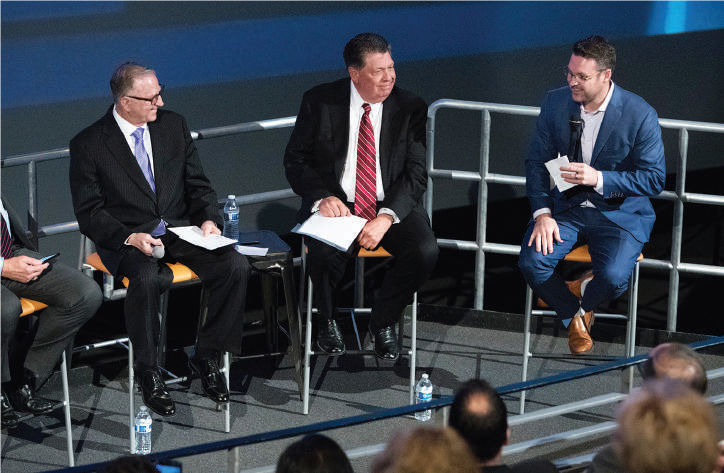By John Rogers
The Utah business community has watched with great interest as Utah tech startup Nikola Motor Co. has progressed toward the start of manufacture of its revolutionary hydrogen-electric semi-truck. The company debuted its Nikola One Class-8 truck in a Hollywood-worthy ceremony at its West Valley plant in December 2016.
{mprestriction ids="1,3"}
Now Nikola’s progress will have to be watched from afar.
Nikola has announced its intention to move its headquarters and proposed billion-dollar, million-square-foot manufacturing facility from Utah to Douglas Ranch/Trillium, a new master-planned community in Buckeye, Arizona, west of Phoenix.
Arizona Gov. Doug Ducey and Nikola founder and CEO Trevor Milton made the announcement in a joint statement.
“After 12 months, nine states and 30 site locations, Arizona, Gov. Ducey, Sandra Watson (Arizona Commerce Authority president and CEO) and Chris Camacho (president and CEO of the Greater Phoenix Economic Council) were the clear front runners,” said Milton. “Arizona has the workforce to support our growth and a governor that was an entrepreneur himself. They understood what 2,000 jobs would mean to their cities and state.”
Although the announcement that Nikola would be leaving its Utah roots seemed to come as a surprise to local observers, the company stated in a December 2016 news release that “Nikola is currently in discussions with several states to decide who to partner with in its effort to reduce America’s dependence on fossil fuels, advance green energy and revolutionize the trucking industry.” The Utah Governor’ Office of Economic Development gave no details on any economic incentives that may have been offered to Nikola and instead directed inquiries to a bill passed in last year’s legislative session designed to attract and retain businesses such as Nikola. During the 2017 general session, the Utah Legislature passed HB405, which allows money from the Community Impact Fund to be used for plants that produce hydrogen fuel for zero-emission vehicles or plants that manufacture zero-emission, hydrogen-fueled trucks. The bill also provides an oil and gas severance tax credit — up to $5 million annually — for a company with a plant converting natural gas into hydrogen fuel for zero-emission vehicles.
When asked about the choice of Arizona, Milton told The Enterprise that “Utah was always in the running.” He said that of the nine states and 30 sites that Nikola considered, “it came down to Utah or Arizona. There are private reasons why Arizona was chosen, but Utah will always be the place where Nikola Motor Co. was founded.”
A Nikola press release said the company selected Buckeye “due to numerous factors, including the state’s pro-business environment, engineering schools, educated workforce and geographic location that provides direct access to major markets.”
Part of the Nikola master plan includes the establishment of hydrogen fueling stations nationwide that the company will own and operate. “We plan on continuing our relationship with Utah as we begin developing our hydrogen station network,” Milton said. Milton also said that the company’s recently established Powersports Division will also move to Arizona.
Nikola could receive up to $46.5 million in grants and tax credits from Arizona entities if it follows through on its plans to invest $1 billion and create over 2,000 jobs, according to a report in the Phoenix Business Journal. Nikola has yet to receive any incentives from the state because the programs are all performance-based, an Arizona Commerce Authority (ACA) spokesperson told the Journal.
The ACA said that the incentive package offered to Nikola includes $3.5 million from the Arizona Competes Fund, a state fund that provide cash grants to promote business growth and diversification; a state-sponsored job training grant of $1.815 million; and tax credits from the Qualified Facility Program of $41.24 million. In order to qualify for the tax credits, Nikola must meet certain requirements for its employees, such as providing health insurance and paying state-established qualifying wages.
“Arizona is awesome,” Milton told the Invest Southwest Venture Madness startup competition audience in Phoenix on Jan. 30. He was a last-minute, surprise keynote speaker for the event. “I had to look at a state with enough workforce. The state is very business-friendly and the governor went to bat for us.”
Milton said that the Nikola move is imminent. “We will begin transferring our R&D and headquarters to Arizona immediately and hope to have the transition completed by October,” he said. “We have already begun planning the construction for our new zero-emission manufacturing facility in Buckeye, which we expect to have underway by the end of 2019.” Milton has said that his company has more than 8,000 trucks on preorder with a retail value of $6.5 billion.
The announcement for the Arizona Nikola plant comes two months after Tesla Inc. unveiled plans for an all-electric semi-truck that it projects will be in production in 2019, although it has not said where the truck will be built. It also comes as companies like Navistar International Corp. and Volkswagen are working to launch electric medium-duty trucks by late 2019 and Daimler AG has delivered the first of a smaller range of electric trucks to customers in New York.
Since Nikola unveiled the Nikola One — and a day cab version called Nikola Two — the company has announced the signing of several partners, including Ryder Systems, which will be Nikola’s exclusive provider for distribution and maintenance nationwide and in parts of Mexico. Bosch and PowerCell AB will supply fuel cells for Nikola’s trucks. In December, truck components company WABCO bought a 1 percent equity stake in Nikola for $10 million.
“Everything people know about trucking is going to be changed because Nikola has changed it,” Milton told Fortune magazine in a November interview.
It just won’t be changed in Utah.{/mprestriction}








